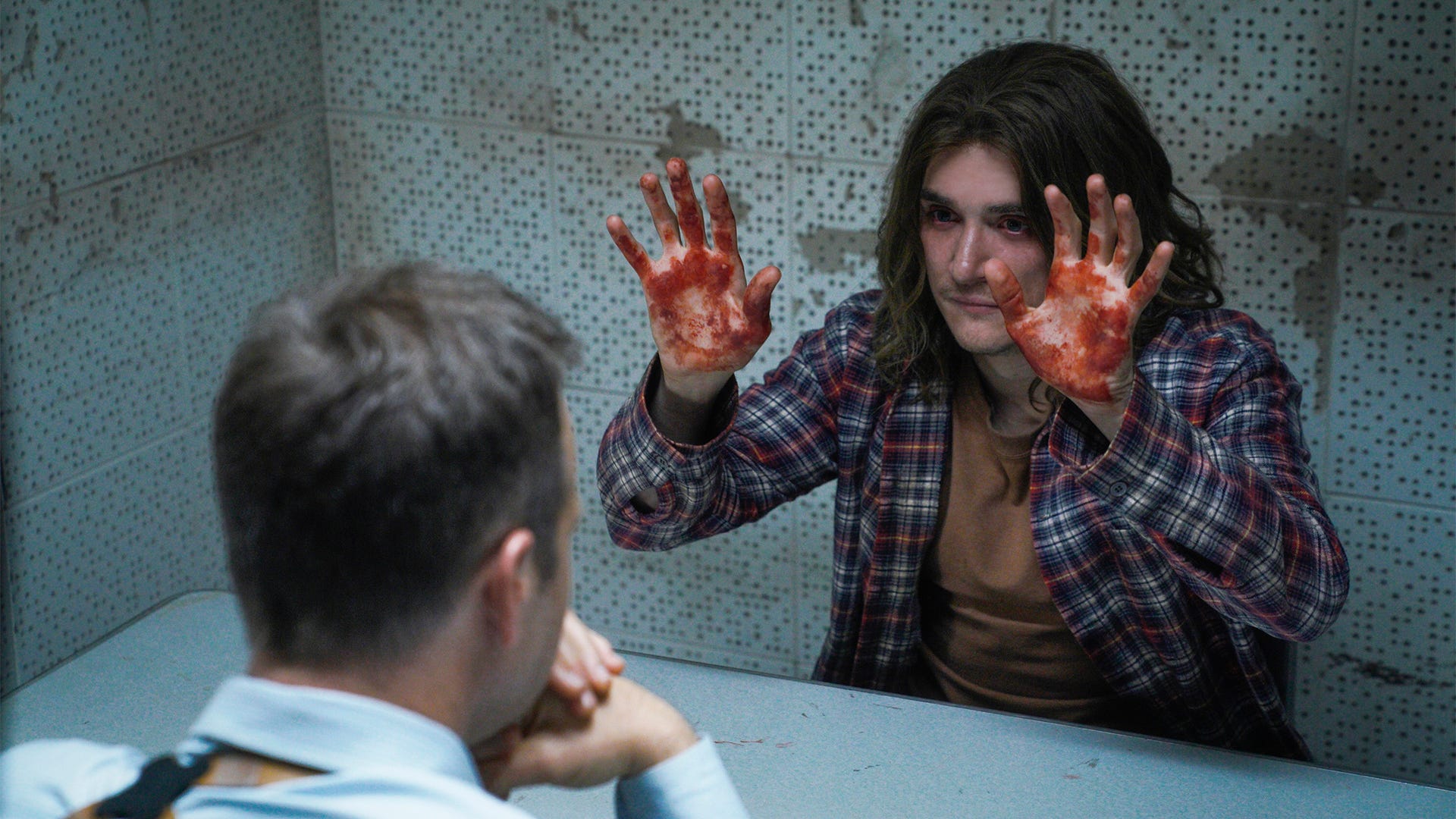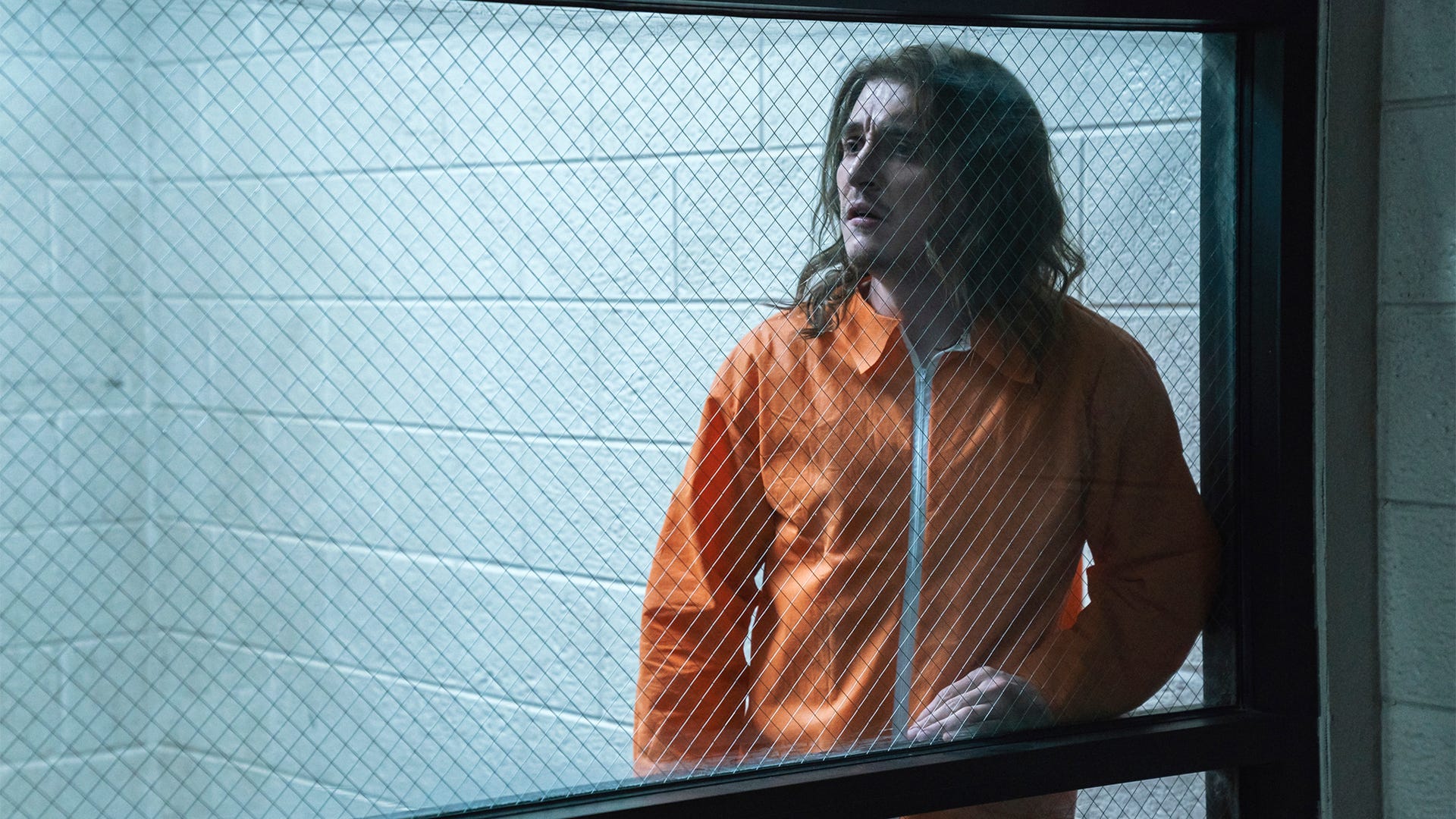Join or Sign In
Sign in to customize your TV listings
By joining TV Guide, you agree to our Terms of Use and acknowledge the data practices in our Privacy Policy.
Interrogation Review: Watching in Order Isn't Required, but Maybe It Should Be
The CBS All Access drama is a competent show -- if watched in an optimized fashion
If there's one thing most TV viewers will associate with CBS, it is the police procedural. It can be navy cops, Las Vegas crime techs, or FBI agents, but they're still investigating a crimes and trying to catch the culprit. Given CBS's general success with the procedural over the decades, it's little wonder the network is aiming to repeat that success on its streaming platform, CBS All Access, albeit with a spin that wouldn't work on traditional TV.
The attempt is Interrogation, a 10-episode series based on an actual case in Los Angeles. (The creators have declined to identify the case and have changed the names of people involved while maintaining their real life conclusions.) The series uses interrogation transcripts, case files, and reporting to shape its narrative of a teenager who was tried and convicted of murdering his mother. This, in and of itself, it not out of the ordinary. If there's one thing older than police procedurals on TV, it's police procedurals that are based on actual crimes. So, taking advantage of being on a streaming platform, Interrogation's spin on the genre encourages viewers to watch the premiere first and then watch the next eight episodes in any order they want before watching the finale, basing the idea on how cold case detectives tackle re-opened cases. Per an opening paragraph that appears before the start of episodes two through eight, those detectives "abandon the linear narrative presented in the files of the original investigation. Instead, they determine their own investigative path, following the evidence in the order they choose." Interrogation wants viewers to "follow the evidence" as presented in the series by deciding their own path through the series and making their own conclusions about the case.
[Editor's note: If viewers don't choose a specific episode after completing the premiere, the next episode in an order curated by the show's executive producers will start playing.]
Discover your new favorite show: Watch This Now!
The gimmick that Interrogation rests on, however, hampers the telling of its narrative and the notion of "following the evidence" while also undermining its already soft indictment of a faulty criminal justice system and preventing any real emotional hook.

Kyle Gallner, Interrogation
Ursula Coyote/CBSInterrogation spans more than 20 years as it tracks the arrest, trial, conviction, and time in prison of Eric Fisher (Kyle Gallner) for the crime of murdering his mother. In addition to Eric's journey through the judicial system of Los Angeles from the 1980s to the 2000s, Interrogation tracks the life and career of the detective who made the case, David Russell (Peter Sarsgaard), and Eric's father, Henry (David Strathairn). Other characters float in and out of the narrative, depending both on the order viewers watch the series and the time period of a particular episode, including a private investigator played by Andre Royo who works to help Eric clear his name and another LAPD detective portrayed by Vincent D'Onofrio.
The facts of the case, however, are less-than-clear from the start, as large portions of episodes are reflected through the memories of Eric and other potential suspects. Memory is a tricky thing, and that is something that Interrogation plays to. Of course, since much of the show's time in the '80s is recalled by people 10 to 20 years after the fact, the very nature of what we can trust is called into question. Scenes that appear in the premiere are recontextualized in other episodes, and so we're left trying to sift out the actual nature of the crime. This is nothing new, of course, in a narrative like this one, where the truth is slippery and elusive and our narrators are unreliable, but more often than not, the different perspectives don't always yield anything compelling or interesting to help the viewer make sense of what happened. This may partially be by design given the case itself, so I'm giving the series some wiggle room.
TV Premiere Date Calendar: Find Out When Your Favorite Shows Are Back
Perhaps more frustrating is that some of our time in the '80s is given to us free of a person's recollection of events. We have no idea whose perspective the events are "from," which results in exposition-centered scenes that feel like "the truth" as opposed to something we should question when considering the rest of show's narrative. While it's certainly likely that these sequences are culled from interviews conducted during the actual investigation, not couching these sequences in a perspective is a weird choice for a series that wants its viewers to question "facts." Sometimes, Interrogation seems to want viewers take it at its word in an effort to keep things moving and to provide some character shading.
Not that character shading does a whole lot over the course of the series. The show's three primary characters -- Eric, Russell, and Henry -- are basically stock characters of the procedural genre; you could probably guess exactly how they behave over the course of the series. It's an odd experience since the arcs of these characters are based on actual people's lives, but they still end up feeling as if the writers sanded off any bits that don't fit this conventional narrative. Of course, it doesn't help that characters don't really have arcs in Interrogation since, depending on how the order in which a viewer watches the series, the characters are sometimes simply different than who they were from the episode the audience just watched, or they're more exaggerated versions of who they were in the past.

Kyle Gallner, Interrogation
John Golden Britt/CBSWhich brings us back to Interrogation's whole schtick. I watched Interrogation in probably the most extreme way the series intended: randomly. I assigned numbers to episodes two through nine and then rolled an eight-sided die to decide which one I watched. This was perhaps not the best way to consume the series since it was entirely random. Even if the show wants viewers to forego a linear narrative, some throughline would compel an investigator forward, following particular threads to their conclusions. For the most part, Interrogation leaves little bread crumbs scattered in episodes to draw attention to another episode, either based on the title or in reference to some event. The premiere's closing scenes, for example, practically poke the audience in the side to watch a specific episode after it while others drop names or events that alert viewers may want to look at next. Episodes don't always do this, however, so a viewer may just sometimes finish an episode and decide their next one based on its description.
I got lucky with my die roll and watched the episode that it felt like the premiere would have wanted me to watch next, and I found that narrative experience watching the show more deeply satisfying than the more randomized approach that my experience took after that. Doing so resulted in me questioning the whole shuffled narrative experience. There's a competent-to-solid-to-good show in Interrogation if watched in an optimized fashion -- most likely as close to the events' chronological order as possible -- one that better captures Eric's struggle to clear to his name in a system that is predisposed against him from the start. As an experiment in a streaming platform's potential to tell stories in different ways, Interrogation will likely be sentenced to being a footnote.
TV Guide Rating: 2/5 (but this may entirely depend on the order you watch it) For the record, I watched it in this order, with the episode titles based on the screeners made available to me: "Eric Fisher," "Chris Keller," "Charles Shannon," "Kim Decker," "Henry Fisher," "Melanie Pruitt," "Dr. Marjorie Thompson," "Sgt. Ian Lynch," "Amy Harlow," and "Trey Carano."
All 10 episodes of Interrogation premiere Thursday, Feb. 6 on CBS All Access.